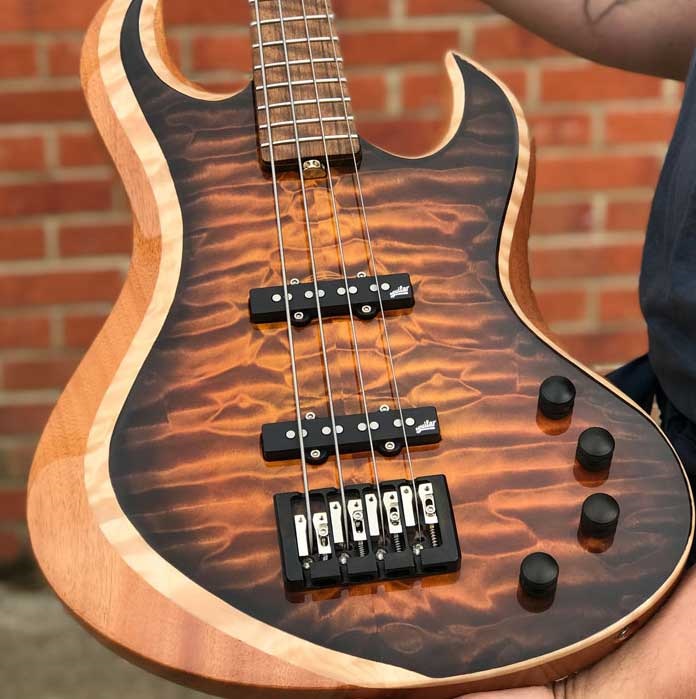Picture courtesy of Feliciano Guimarães
Recently a BBG customer was wondering if some buzz from his Bartolini pickups could have been a grounding issue. He noticed it went away when he touched the strings, so he reached to our expert tech Max for a little insight on staying grounded.
Guitar and bass electronics require an earth or ground to have a quiet operation. There is a path for the ground back to the amplifier via the jack, guitar cord, or amp input, but that’s also how the noise on the ground gets into your signal.
Energy is lazy and will always take the easy way out. The solution for this is to give a more direct path to ground for the energy to follow. However, since guitars and basses are hanging 4 feet off the ground when you strap one on, the only path to ground is though the human body of the player, which is also a conductor.
This is the purpose of having the bridge – and in turn the strings – connected to the ground of the instrument. When you touch the string you are completing a shorter path to ground for the minute neutral energies in your instrument. For this reason it is normal for it to be nosier when you don’t touch the strings or bridge.
Not a really big deal because you have to be touching the string to play the instrument anyway, but you should definitely make the habit of rolling the instrument volume all the way down when you stop to take a drink of water, and not subject anyone or yourself to the additional noise of an ungrounded instrument.
– Max
Best Bass Gear tech



Ever played poolside? Watch out for the puddles was what I learned.
Install EMG active pickups and plastic VT knobs nice and quiet and no ground noise.
Actually, this explanation is incorrect. Unless you’re standing outside in the water barefoot, your body isn’t connected to the ground — at least not enough to make any difference to the tiny voltages and currents involved with an instrument-level signal.
Normally, your body (mostly water, you know) acts like a big antenna, picking up RF noise, and the instrument pickups (which are next to your body) then pick that noise up. If your bridge is properly grounded, then touching the strings effectively shunts all the RF noise from your body to ground, quieting the signal.
But grounded bridges are actually just a crappy/historical workaround for a lack of proper pickup and control cavity shielding. It’s also dangerous, since it does cause your body to become a path to ground whenever you are touching the strings, which is a shock hazard! If your instrument exhibits noise that goes away when you touch the strings, then you don’t have a grounding issue, you have a shielding issue. Do a proper shielding job and then you can most likely disconnect the ground wire from the bridge completely for safety without making it any more susceptible to noise. Alternatively, if you have true active pickups like EMGs, they are internally grounded/shielded and utilize fewer windings in their coils, so they’re already about as immune to noise as you can get — and you still don’t need the bridge grounded, as per EMG’s own instructions.
Thanks, and thanks for wahnitcg. My sound comes from a Digitech GNX4 Guitar Workstation. I like it but it still has a slight processed flavor to it. But overall its pretty sick, I like the built in drum machine and 8 track recorder and its all foot controlled. I teach so its an awesome tool for me. My amp was a Boogie at the time, which I blew a few weeks ago, my new Marshall Tube Head is on the way now. I am excited to see what it will sound like.
I agree. Touching the strings grounds your body. This makes your body into a shield which blocks any EMI coming from behind the instrument and also in front where your right hand is. But it’s also true that grounding the strings does create a bit of a shield in front of the pickups which, with pickups that don’t have foil on top, reduces noise as well (regardless of whether you’re touching the strings).
Actually Keith I think my body is made mostly of beer 😉 But, Yes I believe you are more correct than myself on the technical explanation and perhaps also to some degree your suggested solution. It takes a big man to admit he was wrong, so I must be huge. I’m not really a scientist, just a guitar tech, And I’m glad you where here to provide that explanation! However, It’s almost impossible to fully shield traditional pickups and the copper foil shielding material is not nearly thick as what would really be ideal for an electrical shield. So, the crappy/historical workaround of a bridge ground may have to be part of the solution for most of us. EMG’s, which are very well shielded, have the additional advantage of converting the signal to lo-z before the signal ever leaves the pickup, and the lo-z signals are much less susceptible to picking up noise and interference. So much so that it’s not even necessary to shield instruments that have EMG’s and still have the advantage of not needing the bridge ground too. I would be immensely curious to hear how many non-EMG folks have found it possible to cut their bridge ground wire out after shielding an instrument. My guess would be very few.
I have a p bass with seymore Duncan 1/4 pounders. I shielded with copper shielding tape making sure the tap touched on the pick guard as well and I have absolutely no noticeable rf noise. I also grounded the pickups to the tape via a adittional grounding wire.
Thank you for these lovely tips! I’ll be sure to keep them in mind!
Don’t you hate it when instruments get nosier ’cause you aren’t touching their strings or bridge? It’s like, “Hey. Nosy instrument. Get a life!”
Thanks, I have never experienced a buzz using bartolini pups BTW..
I play in a church and the ONLY place I can olug into is a single circuit that also has two plasma TVs plugged into it.
This, believe it or not, is an environment with a lot of noise.
I plug my amp into a noise filter and there is still noise. The best thing I have found is to go ahead and just turn the treble All the way down and rokk with it.
None if my three basses are noisey anywhere else, all are noisey there.
To be honest…my Ibanez SR506 has never had an issue at all…but my passive P-bass does make some noise when my tone pot is turned up a lil bit…but as long as you maintain your basses well they won’t have any “periods” lol